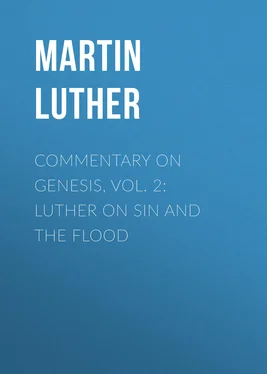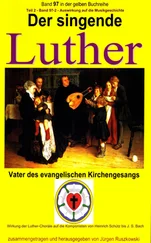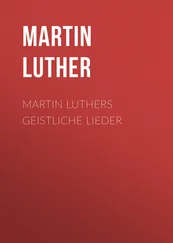Martin Luther - Commentary on Genesis, Vol. 2 - Luther on Sin and the Flood
Здесь есть возможность читать онлайн «Martin Luther - Commentary on Genesis, Vol. 2 - Luther on Sin and the Flood» — ознакомительный отрывок электронной книги совершенно бесплатно, а после прочтения отрывка купить полную версию. В некоторых случаях можно слушать аудио, скачать через торрент в формате fb2 и присутствует краткое содержание. Жанр: foreign_prose, foreign_religion, Философия, foreign_psychology, foreign_antique, на немецком языке. Описание произведения, (предисловие) а так же отзывы посетителей доступны на портале библиотеки ЛибКат.
- Название:Commentary on Genesis, Vol. 2: Luther on Sin and the Flood
- Автор:
- Жанр:
- Год:неизвестен
- ISBN:нет данных
- Рейтинг книги:4 / 5. Голосов: 1
-
Избранное:Добавить в избранное
- Отзывы:
-
Ваша оценка:
- 80
- 1
- 2
- 3
- 4
- 5
Commentary on Genesis, Vol. 2: Luther on Sin and the Flood: краткое содержание, описание и аннотация
Предлагаем к чтению аннотацию, описание, краткое содержание или предисловие (зависит от того, что написал сам автор книги «Commentary on Genesis, Vol. 2: Luther on Sin and the Flood»). Если вы не нашли необходимую информацию о книге — напишите в комментариях, мы постараемся отыскать её.
Commentary on Genesis, Vol. 2: Luther on Sin and the Flood — читать онлайн ознакомительный отрывок
Ниже представлен текст книги, разбитый по страницам. Система сохранения места последней прочитанной страницы, позволяет с удобством читать онлайн бесплатно книгу «Commentary on Genesis, Vol. 2: Luther on Sin and the Flood», без необходимости каждый раз заново искать на чём Вы остановились. Поставьте закладку, и сможете в любой момент перейти на страницу, на которой закончили чтение.
Интервал:
Закладка:
V. 20. And Adah bare Jabal; he was the father of such as dwell in tents and have cattle.
266. The name Jabal is derived from the verb jabal , which signifies to bring forward, or to produce.
V. 21. And his brother's name was Jubal; he was the father of all such as handle the harp and pipe.
267. And the name Jubal has the same origin and signification; for it means produced, or introduced. Both these names, therefore, contain a wish or prayer of Lamech concerning the increase of his family. The posterity of Cain always entertained the object and expectation of surpassing in numbers. And, no doubt, the Cainites held up this temporal blessing in the face of the true Church as an evident proof that they were not cast off by God, but were the very people of God.
V. 22. And Zillah, she also bare Tubal-cain, the forger of every cutting instrument of (an artificer in every workmanship of) brass and iron; and the sister of Tubal-cain was Naamah.
268. Tubal-cain signifies, produce property. So the Romans gave such names as "Valerius" (from valeo), and "Augustus" (from augeo). And Naamah received her name from her sweetness, or beauty. This posterity of Cain increased infinitely; hence Moses breaks off at this point.
269. Now, when he not only chronicles names but makes mention also of the deeds and labors of each one, the Jewish explanation is to be rejected that the offspring of Cain was compelled to follow other occupations because the earth was cursed, and hence gained their livelihood, one as a shepherd, another as a worker in brass, and another as a musician, obtaining grain and the other fruits of the earth from the offspring of Adam. But if the Cainites had been so severely pressed by hunger, they would have forgotten the harp, organ and other instruments of music in their extremity; for the enjoyment of music is not characteristic of the hungry and thirsty.
270. Their invention of music and their efforts in the discovery of other arts is proof that they had the necessaries of life in abundance. The reason, therefore, that the descendants of Cain turned to these pursuits and were not contented with the simple food the earth produced, like the descendants of Adam, was that they wished to rule, and aimed at the high praise and glory of being men of talent. I believe, however, that some of them passed over to the true Church and followed the religion of Adam.
271. And such as Moses here describes the generation of the wicked, or the false church, to be, from the beginning down to the mighty flood of waters, so we find it ever, and such it will remain until the final flood of fire. "The sons of this world are for their own generation wiser than the sons of the light," Lk 16, 8. Therefore it is that they ever advance and increase, and commend themselves and their own, and thus acquire riches, dignities and power; while the true Church, on the other hand, always lies prostrate, despised, oppressed, excommunicated.
Vs. 23-24. And Lamech said unto his wives: Adah and Zillah, hear my voice; ye wives of Lamech, hearken unto my speech: for I have slain a man for wounding me, and a young man for bruising me. If Cain shall be avenged sevenfold, truly Lamech seventy and sevenfold.
272. Thus far Moses has given us a history of the generation of the children of this world, and having brought down the list to the time of Lamech and his wives and children, he buries them, as it were, altogether in silence, leaving them without any promise, either of the life which is to come or of the life that now is. For except that uncovenanted blessing of offspring and of food, the Cainites possessed nothing whatever. Yet they so increased in power and in multitude that they filled the whole world, and at length overturned and ravaged to such an extent the righteous nation of the children of God which possessed the promise of the future and eternal life, and sunk them into so deep a hell of wickedness, that eight men only remained to be saved when the flood came upon the whole world of the ungodly. And though there is no doubt that some of the generation of Cain were saved both before the flood and in the flood, yet the Scriptures do not mention them, to the end that we might the more fear God and walk according to his Word. But hard as the diamond are those human hearts which fail to be moved by such an example as the flood, than which nothing more dreadful is to be found in the whole chain of time.
273. Moses, therefore, having buried in silence the entire generation of Cain, records only one unimportant fact respecting Lamech, but what the real import of that fact is, Moses does not explain. I know not that any other passage in the Holy Scriptures has been so diversely interpreted, and so rent and wrested, as this text. For ignorance at least, if eloquence is not, is fruitful of surmises, errors and fables. I will mention some of the vulgar views upon the passage now before us.
274. The Jews compose the fable that Lamech, when he had grown old and was blind, was led by a youth into the woods to hunt wild beasts, not for the sake of their flesh but for their skins; circumstances which are altogether absurd, and at once prove the whole fable to be a lie. And they hold that Cain was there, concealed among the bushes, and in that solitude he not only exercised repentance but sought security for his life. The young man who directed the spear for Lamech, thinking he saw a wild beast in a certain thicket, told Lamech to hurl his spear, and Lamech hurled his spear and, contrary to all thought, pierced Cain. And they add that after Lamech had been made conscious of the murder he had committed, he immediately speared the youth himself, who also died under the wound he received. It was thus, say the Jews, that the "man" and the "young man" were slain by Lamech. But such absurdities as these are utterly unworthy of refutation. Indeed, Moses himself completely refutes them; he records the fact that Cain, far from fleeing into solitude and concealment, "built a city," which implies that he governed a State and thereby established for himself a kind of kingdom. Moreover, the ages of Cain and Lamech would not accord with this explanation, for it is not at all probable Cain lived to the time Lamech became old and blind.
275. There is still another Jewish invention. After Lamech had killed Cain, his wives would no longer live with him, through fear of the punishment they foreboded would come upon him, and therefore Lamech, to comfort himself and to induce his wives to live with him, prophesied that whosoever should kill him would assuredly be punished "seventy and sevenfold." The Jews invent like absurdities also concerning the sons of Lamech, whom they say he taught to fabricate arms for the destruction of men. Other commentators, again, will have it that the sense of this text is to be taken negatively, thus: If I had killed a man, as Cain killed his brother, I should have been worthy of your reprobation.
276. My interpretation, accordingly, is that the words, "If Cain shall be avenged sevenfold," etc., are not to be taken for the Word of God. For that generation did not have the Word; how, then, could Lamech be believed to have been a prophet? Thus, even such a man as Jerome produces the vagary that, inasmuch as, according to Luke, seventy-seven generations can be counted between Adam and Christ, it was after this space of time that Lamech's sin was taken away by Christ. If such vaporings are legitimate, anything can be proved from the Scriptures. Jerome even forgets that Lamech represented the seventh generation from Adam! The word under consideration then, is not to be placed upon the same level with the former, spoken to Cain; for that was the Word of God. It is, on the contrary, the word of a wicked murderer; not true, but an audacious fiction, based upon that spoken by Adam to Cain. But why does he deliver his discourse not before his church but at home, and only before his wives?
Читать дальшеИнтервал:
Закладка:
Похожие книги на «Commentary on Genesis, Vol. 2: Luther on Sin and the Flood»
Представляем Вашему вниманию похожие книги на «Commentary on Genesis, Vol. 2: Luther on Sin and the Flood» списком для выбора. Мы отобрали схожую по названию и смыслу литературу в надежде предоставить читателям больше вариантов отыскать новые, интересные, ещё непрочитанные произведения.
Обсуждение, отзывы о книге «Commentary on Genesis, Vol. 2: Luther on Sin and the Flood» и просто собственные мнения читателей. Оставьте ваши комментарии, напишите, что Вы думаете о произведении, его смысле или главных героях. Укажите что конкретно понравилось, а что нет, и почему Вы так считаете.












